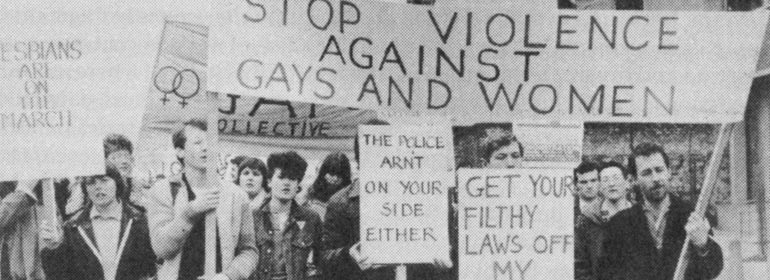Dublin Pride may be a hugely happy celebration nowadays, but it was born of a horrific murder, a shocking court ruling, and a subsequent outpouring of rage, says Rob Buchanan.
34 years ago, Declan Flynn was a 31-year-old Dubliner working for Aer Rianta. Were he living in Dublin today, you might see him as just another good-looking gay lad smiling in a selfie on Facebook or maybe bopping on the dancefloor of The George with his mates of a Saturday night. But Declan, and countless others like him, lies cold in the grave now, his life brutally snuffed out by hatred and ignorance on a cold September night in Fairview Park in 1982.
Dublin in the early ’80s was a grim place to be gay. Criminalisation made it extremely difficult to learn about other LGBT people, let alone actually meet them. Within this environment of dread and isolation there was an ongoing campaign of harassment, blackmail, assault and robbery against gay men, actively ignored by the Gardaí. Driven by desperation to connect, despite the risks, Fairview Park was a place where lonely men could meet.
That fateful night, Declan sat down on a park bench beside another young man. Before he knew what was happening he was set upon by a predatory gang who been lying in wait behind some trees. He managed to break free and ran terrified towards the gate of the park, but he didn’t make it.
The gang caught him and laughing they brutally battered him. They kicked and punched him and beat him with sticks. When he stopped moving and they had exhausted themselves they stole his watch and the £4 in his wallet.
They left his horribly beaten body where it lay, choking on his own blood. Declan would pass away shortly afterwards in hospital.
Not an Isolated Event
Declan Flynn’s brutal murder was not an isolated event. Due to a combination of the criminalisation of gay people and the environment of shame and silence there had been countless unsolved or unreported attacks and murders against gay men in Ireland. The same year that Declan Flynn died, for example, an RTÉ worker called Charles Self was viciously murdered, stabbed 14 times. The Gardaí then began intimidating gay men, interrogating them, rather than looking outside the gay community for Self’s killer.
I’ve never felt that the expression ‘gay bashing’ is appropriate. It seems almost dismissive in its simplicity, reductionist in its childishness. It doesn’t fully articulate the violence, the terror, the chilling effect the crime and its aftermath has on the LGBT community and wider society, as well as the victim.
‘Gay bashing’ doesn’t illustrate the gruesome denigration, the robbery of the person’s safety and sense of self. The feeling you must carry around that simply being who you are makes you a target for possibly life-threatening attack.
The ages of the perpetrators of the murder of Declan Flynn (two 18 year-olds, a 19 year-old, a 17 year-old and a 14 year-old) and their names (with the exception of the youngest ) are a matter public record. When asked about the crime one of the killers blithely said: “We were all part of the team to get rid of queers in Fairview Park”. But it was the deplorable comments of the presiding judge, Justice Sean Gannon, which most chillingly showed the opinion of the courts towards the value of a gay life. As he handed out suspended sentences and allowed all the killers to walk free, he said: “This, could never be regarded as murder.”
Bonded By Outrage
Bonfires were lit and street parties were held in celebration in Fairview as the five murderers returned home to heroes’ welcomes. But if the families of these murderers and the justice system would not respond appropriately to their horrific crime, wider Irish society was disgusted by it and the gay community, motivated by both righteous rage and understandable fear, began to rise up. Disparate minority groups and concerned individuals were galvanised in to action.
A crowd of almost 1,000 people marched from Liberty Hall to the scene of the murder in Fairview Park. Openly gay citizens and their straight supporters from unions, political parties and social organisations stood shoulder-to-shoulder to express their disgust and desire for justice.
The likes of this had never been seen before in Dublin. The visibility of so many LGBT people on the news, in broad daylight as it were, was itself shocking to Irish society. Bonded by outrage and desire for change, a community was formed. The event lit the fuse on the Irish Gay rights movement and that summer the first Dublin Pride took place, more protest than parade. 200 brave vanguards of equality marched from Stephen’s Green to the GPO, and Irish Pride was born.
© 2016 GCN (Gay Community News). All rights reserved.
